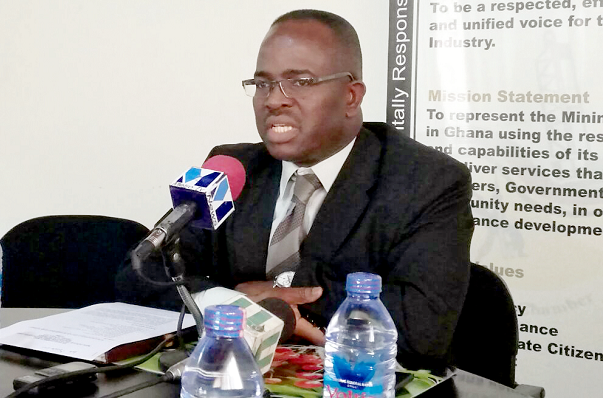
‘Minerals contributed GH¢2.3bn in 2018’
The minerals sector contributed about GH¢2.36 billion in fiscal receipts in 2018, representing 14 per cent of direct domestic receipts and five per cent of government's revenue, the Chief Executive Officer (CEO) of the Ghana Chamber of Mines, Mr Sulemanu Koney, has said.
On the average, he said, the sector's contribution to the country's gross domestic product (GDP) between 2013 and 2018 stood at 8.5 per cent, making it the largest productive sub-sector within the period.
“The sector accounted for some 38 per cent of Ghana’s merchandise exports between 2013 and 2018, making it the fourth largest economic sector, and further saw producing companies retaining an average of 74 per cent of their foreign exchange earnings in the country within the period,” he said.
Workshop
Speaking at the opening of a local content workshop for the mining industry in Accra yesterday, Mr Koney noted that the feat had made it possible for the sector to employ one per cent of Ghana’s labour force, with a multiplier effect on the non-mineral economy.
The workshop, on the theme: “Harnessing the opportunities within the mining industry’s local content: The journey so far and way forward”, brought together mining companies, suppliers and service providers, as well as other relevant stakeholders, to deliberate on the implementation of the procurement list and the local content initiative in general, in line with the objectives set out in the Minerals & Mining (General) Regulations, 2012 (L.I. 2173).
Mr Koney noted that local content remained a critical factor in harnessing the inherent value from the sector for broad-based socio-economic.
Participants also discussed inherent challenges and opportunities in the implementation of local content provisions, proposing what they described as viable solutions, going forward, for the sector.
Mr Koney said local content, when implemented effectively, would lower stock and ensure competitive cost of inputs and better after-market service for players.
Procurement
He, however, expressed worry that whereas the chamber’s producing members in 2018 spent some $1.4 billion on the local procurement of goods and services, that significant value did not reflect in the national statistics.
He maintained that the industry had a number of local firms that supplied products such as grinding media (steel balls), haulage and engineering services, among others, which were meant to create a long-term sustained value chain for the country.
The Mineral Commissions, he said, had issued a five-year procurement plan for the sector which all players ought to abide by, adding: “To improve standards, the chamber, based on the evaluation of the performance of mining firms, has organised workshops to identify challenges and proffer recommendations to improve the procurement of local inputs.”
Similarly, Mr Koney said, the chamber had set up a technical committee to harmonise and develop local standards for electrical cables supplied to the sector and was hopeful that recommendations from the workshop would go to deepen the procurement of locally produced inputs for the sector.
Vice-President
The Vice-President of the chamber, Mr Alfred Baku, who also doubles as the Executive Vice-President & Head of Gold Fields, West Africa Region, for his part, said regardless of the challenges, such as high production cost, falling gold prices on the world market, among others, the mining sector continued to be a key enabler of industrialisation and broad-based economic development in Ghana.
One of the key highlights, he said, was a $27 million contract awarded to four local Ghanaian companies, with some local suppliers also benefitting from the local content policy in terms of fuel supply to member companies, such as Newmont, AngloGold Ashanti, Gold Fields, Asanko, Chirano and Ghana Manganese.
“Indeed, the industry’s confidence in local content has been demonstrated even beyond its core business of mining. However, I believe it could do more than it is presently doing,” he said.
To do that, member companies should proactively engage stakeholders to help build the management and technical capacity of local suppliers in the mining supply chain, he suggested.
“Following the findings of the gap analysis from the engagements, a National Supplier Development Programme was designed in 2014, with the objective to support efforts at strengthening the mining industry's implementation of socially and environmentally responsible business operations and improve the economic situation of local businesses in Ghana,” Mr Baku stressed.
Sanctions
The Head of Policy Planning at the Minerals Commission, Mr Collins Anim-Sackey, in his remarks, stated that in accordance with L.I. 2173 on the localisation requirements of 57 per cent local procurement of inputs, the commission had cited some five companies for breaches of the act.
He said whereas compliance had been quite encouraging, there were those who might still wish to outwit the system, “but when such companies are identified, they are made to pay for the difference in percentage that was imported to deter others from doing same”.
A Deputy Minister of Energy, Mr Amin Anta Adam, called on mining companies to ensure that positioning value addition remained their key focus in driving the success of the entire sector.
